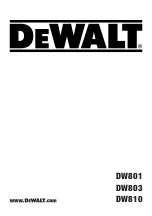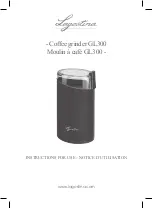
5
English
respirator must be capable of filtrating particles generated
by your operation. Prolonged exposure to high intensity
noise may cause hearing loss.
i )
Keep bystanders a safe distance away from work
area. Anyone entering the work area must wear
personal protective equipment.
Fragments of
workpiece or of a broken accessory may fly away and
cause injury beyond immediate area of operation.
j )
Hold power tool by insulated gripping surfaces only,
when performing an operation where the cutting
accessory may contact hidden wiring or its own
cord.
Cutting accessory contacting a “live” wire may make
exposed metal parts of the power tool “live” and could give
the operator an electrical shock.
k )
Position the cord clear of the spinning accessory.
If
you lose control, the cord may be cut or snagged and your
hand or arm may be pulled into the spinning accessory.
l )
Never lay the power tool down until the accessory
has come to a complete stop.
The spinning accessory
may grab the surface and pull the power tool out of
your control.
m )
Do not run the power tool while carrying it at your
side.
Accidental contact with the spinning accessory
could snag your clothing, pulling the accessory into
your body.
n )
Regularly clean the power tool’s air vents.
The
motor’s fan will draw the dust inside the housing and
excessive accumulation of powdered metal may cause
electrical hazards.
o )
Do not operate the power tool near flammable
materials.
Sparks could ignite these materials.
p )
Do not use accessories that require liquid coolants.
Using water or other liquid coolants may result in
electrocution or shock.
FURTHER SAFETY INSTRUCTIONS FOR ALL
OPERATIONS
Causes and Operator Prevention
of Kickback
Kickback is a sudden reaction to a pinched or snagged rotating
wheel, backing pad, brush or any other accessory. Pinching or
snagging causes rapid stalling of the rotating accessory which
in turn causes the uncontrolled power tool to be forced in the
direction opposite of the accessory’s rotation at the point of
the binding.
For example, if an abrasive wheel is snagged or pinched by the
workpiece, the edge of the wheel that is entering into the pinch
point can dig into the surface of the material causing the wheel
to climb out or kick out. The wheel may either jump toward or
away from the operator, depending on direction of the wheel’s
movement at the point of pinching. Abrasive wheels may also
break under these conditions.
Kickback is the result of tool misuse and/or incorrect operating
procedures or conditions and can be avoided by taking proper
precautions as given below:
a )
Maintain a firm grip on the power tool and position
your body and arm to allow you to resist kickback
forces. Always use auxiliary handle, if provided, for
maximum control over kickback or torque reaction
during start up.
The operator can control torque reaction
or kickback forces, if proper precautions are taken.
b )
Never place your hand near the rotating accessory.
Accessory may kickback over your hand.
c )
Do not position your body in the area where power
tool will move if kickback occurs.
Kickback will propel
the tool in direction opposite to the wheel’s movement at
the point of snagging.
d )
Use special care when working corners, sharp edges
etc. Avoid bouncing and snagging the accessory.
Corners, sharp edges or bouncing have a tendency to
snag the rotating accessory and cause loss of control
or kickback.
e )
Do not attach a saw chain woodcarving blade or
toothed saw blade.
Such blades create frequent kickback
and loss of control.
Safety Warnings Specific for Grinding
Operations
a )
Use only wheel types that are recommended for your
power tool and the specific guard designed for the
selected wheel.
Wheels for which the power tool was not
designed cannot be adequately guarded and are unsafe.
b )
The grinding surface of centre depressed wheels
must be mounted below the plane of the guard lip.
An improperly mounted wheel that projects through the
plane of the guard lip cannot be adequately protected.
c )
The guard must be securely attached to the power
tool and positioned for maximum safety, so the least
amount of wheel is exposed towards the operator.
The guard helps to protect the operator from broken wheel
fragments, accidental contact with wheel and sparks that
could ignite clothing.
d )
Wheels must be used only for recommended
applications. For example: do not grind with the side
of cut-off wheel.
Abrasive cut-off wheels are intended
for peripheral grinding, side forces applied to these wheels
may cause them to shatter.
e )
Always use undamaged wheel flanges that are
of correct size and shape for your selected wheel.
Proper wheel flanges support the wheel thus
reducing the possibility of wheel breakage.
Flanges
for cut-off wheels may be different from grinding
wheel flanges.
f )
Do not use worn down wheels from larger power
tools.
Wheel intended for larger power tool is not suitable
for the higher speed of a smaller tool and may burst.
WARNING:
We recommend the use of a residual current
device with a residual current rating of 30mA or less.




























